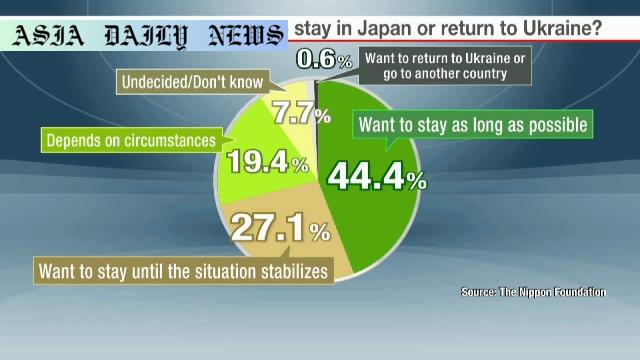Ukrainian evacuees: Over 70% express interest in residing long-term in Japan, survey reveals challenges and continued hopes.
- Over 70% of Ukrainian evacuees in Japan hope to stay long-term.
- Nippon Foundation survey highlights both hope and challenges.
- Financial aid for evacuees ending after three years.
- Community support significantly impacts evacuees’ integration.

Introduction
The ongoing conflict in Ukraine has displaced countless individuals and families, forcing them to seek refuge in foreign lands. Among these are nearly 2,000 Ukrainian evacuees who have found safety in Japan. A recent survey conducted by the Nippon Foundation sheds light on their sentiments and future aspirations, revealing that over 70% hope to remain in Japan for an extended period. While this reflects their desire for stability and hope for integration into Japanese society, challenges surrounding financial aid, employment, and community support continue to emerge.
Survey Highlights: Aspirations for Stability
The survey, conducted between October and December of last year with the participation of 887 Ukrainian evacuees, paints a vivid picture of their aspirations. When asked about their long-term plans, 44.4% of respondents expressed a desire to remain in Japan for as long as possible, while 27.1% indicated they wished to stay temporarily until the situation in Ukraine stabilizes. These figures underscore the evacuees’ yearning for a secure and stable life amid the uncertainty wrought by the ongoing conflict in their homeland.
Challenges Ahead: Financial Aid and Adaptation
While their aspirations remain high, the cessation of financial aid presents a major obstacle for many evacuees. The Nippon Foundation, which has provided an annual stipend of one million yen (approximately $6,600) to evacuees for up to three years, announced that this assistance would be discontinuing this month. With financial support phasing out, evacuees must navigate challenges such as finding stable employment, acquiring Japanese language skills, and adjusting to a new cultural environment. The transition highlights the importance of sustainable and innovative solutions to foster their integration into Japanese society.
Human Stories: Overcoming Barriers
The story of Ukrainian evacuee Samarukha Oleksandr exemplifies resilience amidst adversity. A high school student in Nagasaki Prefecture, he recalled early struggles, including a lack of Japanese language proficiency that hindered his participation in classes and exams. However, with the unwavering support of teachers and friends, Oleksandr overcame these barriers and is set to embark on a new journey as a university student in April. His aspiration to become a cabin attendant reflects the ambition and hope many evacuees carry as they rebuild their lives in Japan.
Community Support: A Pillar of Integration
The role of community support has been instrumental in helping evacuees adapt to their new environment. From education to employment, local communities, schools, and organizations have contributed significantly to their integration. Stories like Oleksandr’s highlight the impact of empathy and outreach in easing their transition. However, as financial aid diminishes, there is an increasing need for grassroots efforts and initiatives aimed at supporting evacuees in the long term.
Conclusion
As Japan welcomes Ukrainian evacuees, the survey underscores the dual facets of hope and challenge these individuals navigate every day. Over 70% expressing a desire to stay highlights their commitment to building a new life in Japan, even as they grapple with hurdles like diminishing financial aid and employment opportunities. Their resilience and adaptability underline the importance of continued support from both the government and local communities. By fostering integration and addressing the obstacles they face, Japan has the opportunity to provide a sanctuary that not only meets their immediate needs but also empowers them toward a brighter future.



Commentary
The Resilience of Ukrainian Evacuees
The results of the survey conducted by the Nippon Foundation are a poignant reminder of the resilience and adaptability of human beings, even in the face of adversity. The fact that over 70% of evacuees express a willingness or desire to stay in Japan shows not only their determination to create stability for themselves and their families but also their recognition of the opportunities Japan provides amid their challenging circumstances. It is inspiring to see such resilience despite the immense emotional toll of being uprooted from one’s homeland.
Challenges Demand Long-Term Solutions
While hope remains strong among the evacuees, the discontinuation of financial aid presents a critical challenge. This development highlights the need for sustainable support structures that go beyond short-term financial assistance. Employment opportunities and cultural integration programs will be key to enabling these evacuees to integrate seamlessly into Japanese society. Additionally, access to language education and skill development will empower them to become self-reliant contributors to their adopted community.
A Shared Responsibility
The stories of individuals like Samarukha Oleksandr are heartwarming examples of what can be achieved when communities step up to support those in need. Teachers, friends, and local advocates have made immeasurable contributions to his journey. It serves as a powerful reminder that integration is not solely the responsibility of governments or large organizations; it is a shared responsibility that involves individuals, communities, and corporations alike. Continued efforts to support evacuees will not only benefit them but will also enrich Japanese society through their diverse experiences and talents.